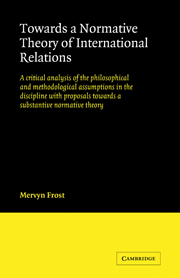 Towards a Normative Theory of International Relations
Towards a Normative Theory of International Relations Book contents
- Frontmatter
- Contents
- Acknowledgements
- Introduction
- PART ONE
- CHAPTER ONE The positivist bias: a philosophical assumption which accounts for the dearth of normative theory in the discipline of international relations
- CHAPTER TWO Sceptical and realist arguments against normative theory in international relations: a critical appraisal
- PART TWO
- Conclusion
- Bibliography
- Index
CHAPTER ONE - The positivist bias: a philosophical assumption which accounts for the dearth of normative theory in the discipline of international relations
Published online by Cambridge University Press: 05 March 2012
- Frontmatter
- Contents
- Acknowledgements
- Introduction
- PART ONE
- CHAPTER ONE The positivist bias: a philosophical assumption which accounts for the dearth of normative theory in the discipline of international relations
- CHAPTER TWO Sceptical and realist arguments against normative theory in international relations: a critical appraisal
- PART TWO
- Conclusion
- Bibliography
- Index
Summary
Introduction
Actors in the realm of international relations are regularly faced with normative questions. They are often called upon to decide what, given the specific situation, would be the right thing to do. The problem is not, or not only, the one of deciding upon the best means to an approved of end; that is, the problem is not purely technical. The moral problem is to choose the ends to be pursued and to decide upon what means might legitimately be used in pursuit of those ends.
The kind of problem which faces actors in the realm of international relations is well illustrated in the present day Middle East. Israeli politicians have to decide on the right thing to do with regard to the Palestine Liberation Organization (PLO). The Lebanese and Arab leaders, the governments of the United States and the USSR, each have to decide what rights, recognition and support (if any) ought to be accorded to the PLO. The normative nature of the problem is not dissolved by suggesting that the actors always do (and will) act according to their respective self-interests. What is to count as self-interest is partially determined by normative considerations. For example, where Israel defends a particular course of action on the ground that she is defending her self-interest, part of what is being asserted is that this particular interest ought to be recognized as a legitimate one, as one which ought to be defended.
- Type
- Chapter
- Information
- Towards a Normative Theory of International RelationsA Critical Analysis of the Philosophical and Methodological Assumptions in the Discipline with Proposals Towards a Substantive Normative Theory, pp. 9 - 41Publisher: Cambridge University PressPrint publication year: 1986
